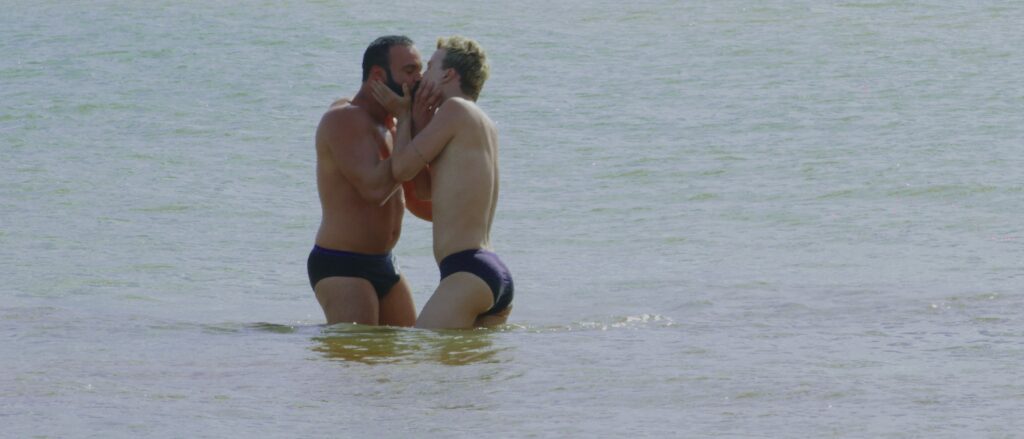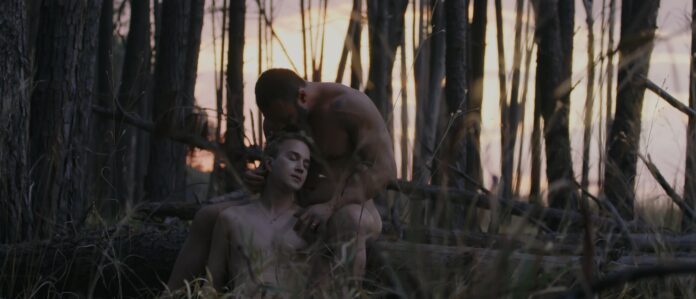“Behind the Trees,” written, directed by, and co-starring Thiago Cazado, is an erotic romance about second chances that is now available on demand and DVD. Paulo (Léo Carius) is an unhappily married straight man who inadvertently stumbles onto a cruising area in the woods while out biking one day. He is initially put off by the encounters he witnesses, but he is captivated by Luigi (Cazado), a young man he meets in the woods.
As bi-curious Paulo returns to the woods to meet Luigi—and gives into his same-sex desires—he feels guilt. His wife, Jennifer (Maria Guedes), wants a baby, and he meets with his priest for absolution. But Paulo cannot get Luigi out of his head, and he risks being outed by his neighbor, who secretly frequents to the woods as well.
“Behind the Trees” uses the relationship between Paulo and Luigi to help both men discover what (and whom) they want in life. As Paulo’s situation with Jennifer becomes more complicated, Luigi confesses to Paulo what he wants out of their affair.
Cazado spoke with PGN about making his new film.
What inspired this story, which portrays the relationship between two very different men?
I look for stories that portray something universal, and that can inspire people. There are men who have difficulty living their true sexuality, and how that unfolds was a classic story. There is a real place here in Brasilia where I live, called the “Forest of Whispers.” There are [cruising areas] like this all over the world. I thought it was worth making a film about this.
Can you talk about how you wanted to portray the relationship between Paulo and Luigi?
I wanted to show something real in this relationship. The starting point of the connection between the couple is sex. Socially, the repressed gay man seeks to express only his sexual side, as he does not have the courage to live fully. But then the emotional conflict comes in, and he finds himself truly in love with Luigi who is out and seeks affection. I wanted to show this evolution in the film—how romance develops based on sex. The couple’s biggest challenge is to overcome the social barriers they feel. They have honest conversations about this, because there is a lot of emotion between them, despite their differences.
Can you talk about filming the nudity and sex?
I am not ashamed of nudity. This is not the first time I have been naked in a film. I like nudity and gay movies are a good place for that. In my scripts, I like to portray desire and write about masculinity and erotica, and the conflicts of sexuality. My movies need to have naked bodies. I show my body too. Maybe I’m a bit of an exhibitionist. When I take off my clothes on set, I feel calm. The crew is more embarrassed than I am, but this passes quickly.
What is the film saying about masculinity? There are several lines in the film where a character justifies his queer behavior by saying “this is what men do,” and a nice scene featuring an older sex worker.
I observed this in real life by visiting this cruising area. There are men who behave “macho,” and men who dress as women. The sex workers in the film look for opportunities. I wanted to show this clandestine place as somewhere where secret desires are revealed. I also took the opportunity to address ageism. We all age and we won’t be young forever. There is sex, and desire, and beauty and self-esteem even when we get older. I wanted to put a stop to this prejudice.
We can see why Paulo, an older man, is interested in the young Luigi, but what does Luigi see in Paulo?
I think Luigi loves sex intensely. He has a compulsive behavior, like he does with smoking. You see my character smoking all the time in the film, but in fact I don’t smoke, and I had to learn for the film! I wanted to highlight his addictive behavior through these vices. His emotional problems stem from his lack of a father or a mother, and a lack of love. He tries to fill this void with sex. But he ends up falling in love when he gets involved with Paulo. Paulo challenges Luigi. Luigi finds affection because of the novelty.
The film is about second chances. Paulo has anguish and feels his life is empty and needs meaning. Luigi does too, to a degree. What are your thoughts about reinventing yourself?
This is a perfect question! The film is about that—about allowing yourself to live in the now, and about overcoming the power that the society has over the individual. Only you can experience the emotions of your life. You need to give yourself the chance to be happy, and this may involve you reinventing yourself. Life is always changing, and we have to be careful to live how we want. Paulo needed to reinvent himself and have courage to be happy, Luigi needed to heal. Reinvention is a courageous act. It is necessary to break other people’s expectations and judgments. Only you know what you need to make your life count. I want the audience to finish the film with a desire to live, to reinvent themselves, to forgive themselves, to accept themselves, and to make their dreams come true.


